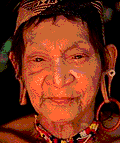

"This is the place of our origins. This is our home, this land of the Ubong River, of the Magoh River. It is as if this land were our longhouse. This is the land of our origins. I tell the children that this is our land, that this is our longhouse... We have never moved, we have never left this land.
"I come from no place but here. That is why I stay here. I was born right here, just up the hill, up the river... Ever since I was a tiny child, and my parents carried me, and led me by the hand, I have lived here. Ever since I was a little child, ever since I became an adult, I have remained here, on the Ubong River. Just as the longhouse people have their place, we too have ours; even though we do not live in a longhouse, this is our place, this area along the Ubong River, where we wander.
We have stayed here and hunted pig, and hunted birds, and hunted deer, and obtained our food. Certainly we have never left this land. My grandfather and my grandmother and my mother and my father are all dead, but they died here, they didn't die in any other place. They died here, at the Ubong River, at the Magoh River, and the old headman, the headman before me, he died here, right at this very spot, at Bila Creek. At the Sepugung River, at the Malai River, at the Tepen River, at the Ya'ong River. And the headman Tamen Tering, and old Lawai, this is the place where they died. This is where we have always lived, this is where we have always stayed."
Wé Salau, the old headman, Baa' Bila, April, 1993
The mouth of the Baram River is the color of the earth. To the north, the soils of Sarawak disappear into the South China Sea and fleets of empty Japanese freighters hang on the horizon, awaiting the tides and a chance to fill their holds with raw logs ripped from the forests of Borneo. The river settlements are settings of opportunity and despair- muddy logging camps and clusters of shanties, their leprous facades patched with sheets of metal, plastic and scavenged boards. Children by the river's edge dump barrels of garbage which drifts back to shore in the wake of each passing log barge. For miles the river is choked with debris and silt and along its banks lie thousands of logs stacked thirty deep, some awaiting shipment, some slowly rotting in the tropical heat.

A hundred miles upriver is another world, a varied and magical landscape of forest and soaring mountains, dissected by crystalline rivers and impregnated by the world's most extensive network of caves and underground passages. This is the homeland of the Penan, one of the few remaining nomadic peoples of the rain forest. Related in spirit to the Mbuti pygmies of Zaire and the wandering Maku of the Northwest Amazon, the Penan draw their life from the land, moving as hunters and gatherers through the immense and remote forested uplands that give rise to the myriad affluents of the Baram and Limbang Rivers of northern Borneo.
An enlargement of Meteri and Lia standing by the waterfall (54 K, JPEG)